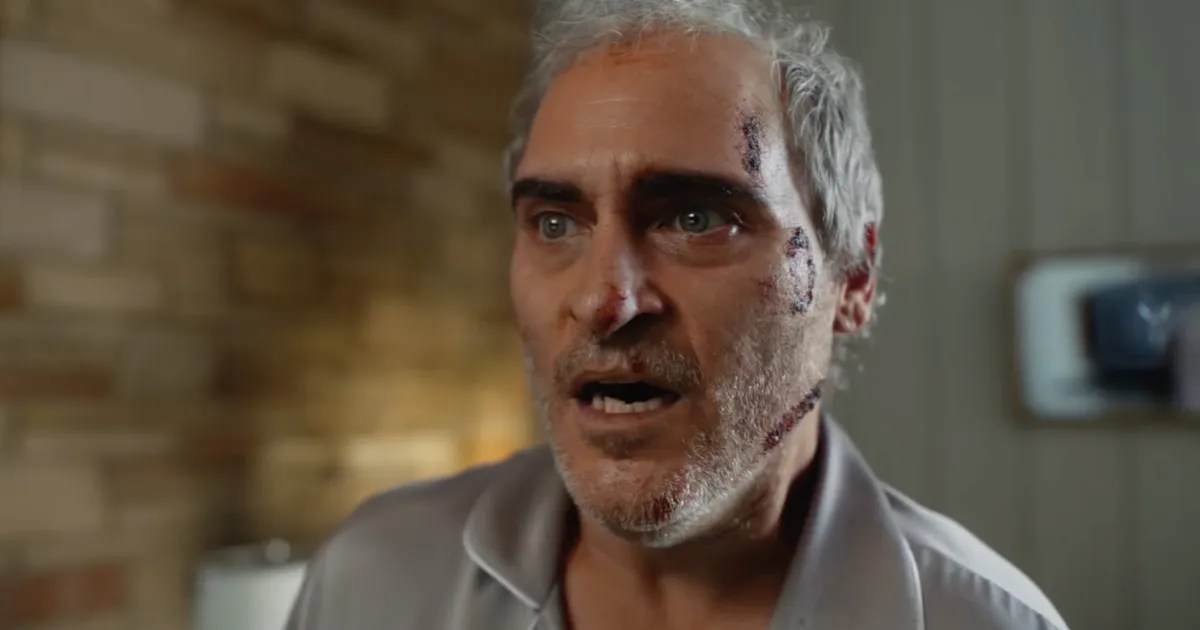I Love This Expression of Millennial Angst in ‘Beau is Afraid’

Beau is Afraid isn’t a perfect movie. As I wrote in my review, it juggles more ideas than it can really handle. I do want to take a closer look at one of those ideas, though, because it resonated deeply with me.
The first act of Beau is Afraid takes place is Beau Wasserman’s apartment. His neighborhood is the depths of middle-class paranoia come to life: drug dealers, weirdos, and murderers roam around his building while hostile neighbors blast music and steal his stuff. His building is infested with deadly spiders and covered in lewd graffiti, and his landlord can’t be bothered to help. In one of the funniest moments in the movie, Beau races to the bodega across the street for water to wash down his medication, and while his card is declined again and again, everyone on the street makes a beeline for his apartment so they can trash it.
It’s a very different setting from the final act, in which Beau reaches his mother’s house. Mona Wasserman is a self-made businesswoman, and it shows. She lives in a vast, labyrinthine mansion in the countryside, with a whole wall devoted to news clippings of her success. Even her faked death is decadent, with her head supposedly crushed by a chandelier. From her luxurious living room, Mona spews vitriol at Beau for all the ways she thinks he’s failed her.
The stark contrast between Beau’s squalid living conditions and his mom’s cushy lifestyle is an expression of Beau’s own fear of not measuring up. His mother’s home represents fraught memories of a childhood in which Beau was given everything except love and acceptance, and the poverty he lives in now reflects that emotional state. At least, I’m assuming that’s what Ari Aster was going for.
However, I couldn’t help but connect Beau’s crappy apartment, paired with Mona’s mansion, to the literal housing crisis happening all around us. Rent prices, mortgages, and interest rates are spiraling out of control, with wages stagnating so that many of us are functionally making less than we did a few years ago. In my home state of California, the average house now costs over $700,000. It’s an absolutely absurd amount of money to have to pay for a place to live.
Obviously some people have been hit much harder than others. But for gen Xers like Beau and millennials like me, one especially insulting aspect of the housing crisis is wealthy boomers clucking their tongues at us from their own beautiful homes. You know, the four-bedroom houses they bought in the ’70s and ’80s with down payments they found between their couch cushions. The homes whose monthly payments they made by showing up each day to the first clerical job they stumbled into. Or maybe the retirement homes they bought with equity that rivals Scrooge McDuck’s vault of gold coins. The formula of boomers calling younger generations lazy and entitled is almost a parody at this point, and yet it keeps happening.
It’s also mind-blowing to see boomers rail against building new housing to alleviate the problem. In Berkeley, CA, for instance, a group called “Save Berkeley’s Neighborhoods,” led by a former investment banker living in a $1.5 million house, almost forced UC Berkeley to turn students away when the group tried to shut down new student housing. Once, I literally screamed in my car when I passed a NIMBY billboard showing a mournful old women saying, “This new anti-homelessness initiative will lower my property values, and I can’t afford that.” The hell you can’t, lady! What, are you using your rental properties to save up for a third private yacht? This billboard was in one of the richest neighborhoods in L.A.
Ow. As a work of surrealism, Beau is Afraid is over the top, but it still hits a nerve. And while Mona Wasserman is a cartoonish villain, her hypocrisy is right on the nose. Many of us will probably never achieve the same quality of life that our parents enjoy—but our parent’s generation will never admit responsibility.
(featured image: A24)
Have a tip we should know? [email protected]
